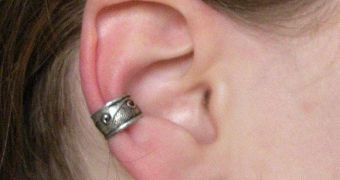A group of scientists proposes a new method for reducing the severity of tinnitus. This is a condition of the human ear, in which people hear what can best be described as “phantom” sounds and ringing, even though no discernible sound source exists. Experts from the Dallas-based startup Microtransponder say that they have developed a method of addressing this condition that showed great result in animal testing. They presented their finding last week in Boston, at a neurotechnology conference.
According to Technology Review, the key element of their new technique is stimulating the vague nerve with electrical impulses. This nerve is a crucial pathway between the central nervous system and the visceral organ, and the group explains that stimulating it via noninvasive, wireless technology can be extremely beneficial. Their studies were conducted in animal model that suffered from conditions very similar to tinnitus. The results are promising, the team said at the conference, and plans are for the new therapy to be translated to humans soon. Clinical trials would let scientists know whether this avenue of research is worth pursuing for human applications as well.
The investigation is very important, researchers say, because tinnitus is a condition that affects millions of people worldwide. Certain individuals, such as musicians and those working in loud environments, are more prone to developing it at one point in their lives. If exposure to powerful sound sources is not discontinued, and medical treatment sought immediately, then the worst consequence may be complete hearing loss. Most existing therapies against tinnitus tend to try and mask the sounds that people hear, rather than eliminate their source altogether, the Microtransponder group argued.
Though no clear cause for this condition has been identified thus far, scientists believe that it may be triggered by the brain's effort to compensate for hearing loss. Hair cells in the middle ear are in charge with converting acoustic waves into electrical signals that are then passed to the brain, but prolonged exposure to noise can affect their activity. When this happens, the amount of electricity reaching the brain from the ears decreases, and the cortex attempts to compensate for that by boosting sensitivity. This causes the ear to pick up anomalous sounds that are not actually there. With the electrical stimulation-based approach, the Microtransponder team hopes to be able to solve the root of the problem, not simply mask the sounds.

 14 DAY TRIAL //
14 DAY TRIAL //